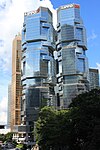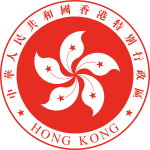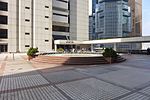Umbrella Square
2014 Hong Kong protestsEngvarB from December 2014Occupations (protest)Occupy movementProtest camps ... and 1 more
Temporary populated places

Umbrella Square (Chinese: 雨傘廣場), also called Umbrella Plaza, describes a large roadway in Admiralty, Hong Kong occupied by protesters during the Umbrella Movement protests in September 2014. On 11 December 2014, after 74 days of occupation, the area was cleared by the police and reopened to motorised traffic.
Excerpt from the Wikipedia article Umbrella Square (License: CC BY-SA 3.0, Authors, Images).Umbrella Square
Justice Drive, Hong Kong Island Admiralty (Central and Western District)
Geographical coordinates (GPS) Address Nearby Places Show on map
Geographical coordinates (GPS)
| Latitude | Longitude |
|---|---|
| N 22.2795155 ° | E 114.164129 ° |
Address
金鐘 Admiralty
Justice Drive
Hong Kong Island, Admiralty (Central and Western District)
Hong Kong, China
Open on Google Maps











